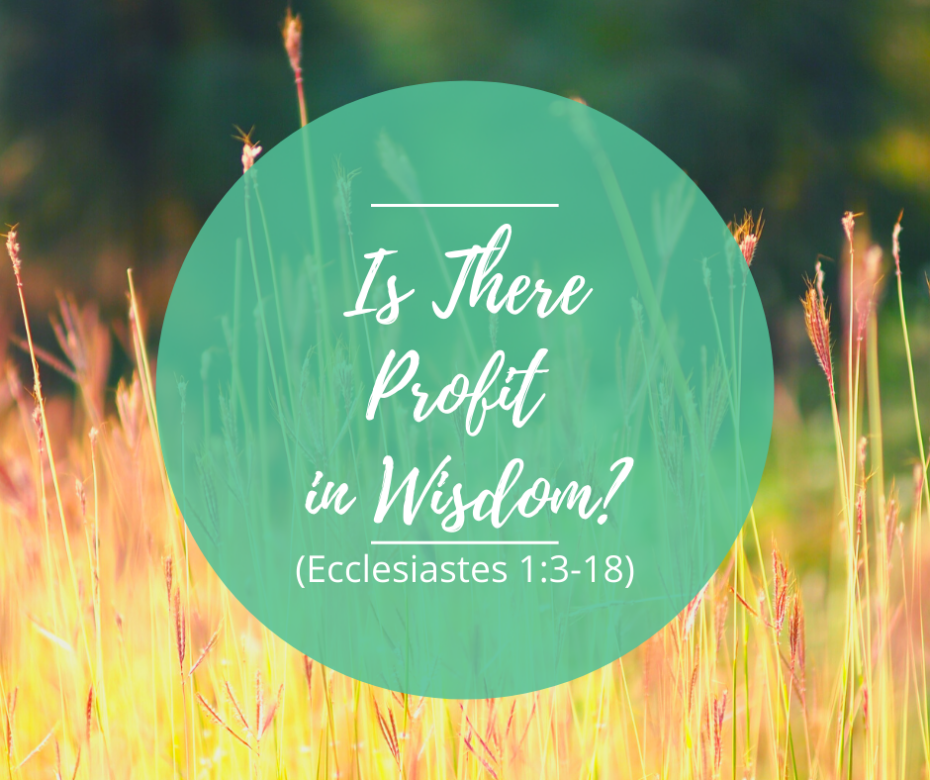Where do you find true happiness?
Where have you been taught to find it, by family, friends, church, school, and Hollywood?
If anyone was in a position to discover the meaning of life, it was King Solomon, the son of David, supremely wise, and rich beyond comprehension (cf. Eccl 1:1, 12; 1 Kings 3, 10). If anyone could be happy, wouldn’t it be he? And if he couldn’t find happiness, what chance do we have?
And yet, according to the book of Ecclesiastes, Solomon concluded that everything under the sun was vanity.
“Vanity of vanities,” says the Preacher;
“Vanity of vanities, all is vanity” (Eccl 1:2).
At least, everything under the sun amounts to vanity. And for that reason, Ecclesiastes is a word of warning to our generation. “Ecclesiastes is the book we moderns fear more than any other. For it is a mirror that shows us a great hole, a black spot, where our heart ought to be” (Peter Kreeft, Three Philosophies of Life, 31).
Ecclesiastes is about finding meaning under the sun, i.e., in the natural world. That’s what secular people try to do. They look for meaning apart from God and Christ. But Solomon will argue the attempt is futile. As Tony Evans said, “if you look for the meaning of life in life, you’ll never find it” (The Tony Evans Bible Commentary, p. 617).
Why not?
Solomon’s first attempt to find meaning was through wisdom.
When God asked Solomon what he wanted for a gift, Solomon, echoing Eden, asked for “an understanding heart to judge Your people, that I may discern between good and evil” (1 Kgs 3:9). (Is Solomon being portrayed as a New Adam? Cf. Gen 2:9, 17; 3:5, 22) Thus, Solomon became one of the wisest men who ever lived. But did that give his life meaning?
It did not.
In Ecclesiastes 1-11, Solomon looks at the world—the natural processes of world—and what he sees depresses him. The question is,
What profit has a man from all his labor
In which he toils under the sun? (Eccl 1:3).
What does it profit?
Solomon looked at nature, and he realized that no matter what he did, the world would just go on without him.
What profit is there, when the end of all his labor is death, generation after generation of death, while the earth continues on its merry course?
One generation passes away, and another generation comes;
But the earth abides forever (Eccl 1:4).
What profit is there to his labor, when no matter what he does, the sun will still rise, the wind will still blow, and the rivers will still run to the sea?
The sun also rises, and the sun goes down,
And hastens to the place where it arose.
The wind goes toward the south,
And turns around to the north;
The wind whirls about continually,
And comes again on its circuit.
All the rivers run into the sea,
Yet the sea is not full (Eccl 1:5-7a).
What profit is there, when everything is so monotonous, when it has all been done before, and there’s nothing unique to add to the world?
That which has been is what will be,
That which is done is what will be done,
And there is nothing new under the sun (Eccl 1:9).
What profit is there, when no matter what he does, or how great he becomes, Solomon, and everyone, will eventually be forgotten?
There is no remembrance of former things,
Nor will there be any remembrance of things that are to come
By those who will come after (Eccl 1:11).
Sadly, it profits nothing. (At least, not in the long run.) It’s all vanity:
I have seen all the works that are done under the sun; and indeed, all is vanity and grasping for the wind (Eccl 1:14).
When Solomon looked for meaning in life, using his wisdom, what he discovered was his own insignificance, and therefore, the lack of purpose in anything he could accomplish. “Short-run purpose is no compensation for long-range purposelessness” (Kreeft, Three Philosophies of Life, p. 29).
What profit is there in wisdom—at least, in wisdom focused inwardly, on the self (v 16)—when it only results in sorrow?
For in much wisdom is much grief,
And he who increases knowledge increases sorrow (Eccl 1:18).
In the end, Solomon realized it didn’t matter if he was wise or foolish because in the long-term, both the wise and the foolish die and are forgotten:
For there is no more remembrance of the wise than of the fool forever,
Since all that now is will be forgotten in the days to come.
And how does a wise man die?
As the fool! (Eccl 2:16).
You might want to shout at Solomon, “But wait! There’s so much more than what’s under the sun!” And there is, and we’ll get to that in a future blog, but for now let’s hear Solomon out and remember that he’s writing from a certain point of view—the worm’s eye view—the naturalist’s point of view—the perspective “under the sun.” Solomon is giving us a reductio ad absurdum for that question.
Can you find the meaning of life in life? The answer to Solomon’s first question is not through wisdom.


